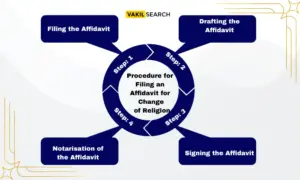Understand the importance of a Change of Religion Affidavit in India and learn how to create one! Find out the procedure for filing an affidavit for a change of religion and the documents required.
Introduction
Religion is an integral part of our identity, and as such, it is important to have the correct records reflecting our religion. In India, for legal purposes, a person must submit an affidavit to change their religion. The Change of Religion Affidavit is an important document that is used to register a person’s change of religion in India. Vakilsearch is a platform for legal services in India, that helps you understand the process of a Change of Religion Affidavit, the process of creating and filing the affidavit and assists you in the entire process.
What Is a Change of Religion Affidavit?
A Change of Religion Affidavit is a legal document used to register a change in the religious identity of a person. This document is used to register the change of religion in India and is a vital document when applying for a passport or a marriage certificate. The Change of Religion Affidavit is generally accepted as the primary document to record the change of religion in India.
Why Is a Change of Religion Affidavit Important?
The Change of Religion Affidavit is an important document because it is the primary document used to register the change of religion in India. The affidavit is used to provide evidence of a person’s change of religion and is a necessary document for many legal processes, such as applying for a passport or a marriage certificate. As such, a person needs to submit an affidavit to change their religion in India.
In addition, the Change of Religion Affidavit is important because it is an official document that is legally binding. This means that a person’s change of religion is legally recognised once the affidavit is filed, and the affidavit can be used in court as evidence of the change of religion.
How to Create a Change of Religion Affidavit?
Step 1: Begin with a Heading: It is important to start your affidavit with a clear heading. This should include the words “Affidavit of [Your Name],” followed by your full name, address, and the date the affidavit was written. This will ensure that the document is properly identified and can be easily located.
For example, if your name is John Smith and you are writing an affidavit of change of religion, the heading should read:
“Affidavit of John Smith, 123 Main Street, Anytown, India, Dated: [date]”
Step 2: State Your Intent: After the heading, state your intention for writing the affidavit. For example, you could start with a sentence like “I, [Your Name], am writing this affidavit to affirm my desire to change my religion from [Old Religion] to [New Religion].”
For example, if you are changing your religion from Hinduism to Christianity, your sentence could read:
“I, John Smith, am writing this affidavit to affirm my desire to change my religion from Hinduism to Christianity.”
Step 3: Provide Your Personal Information: After stating your intent, provide basic personal information such as your date of birth, place of birth, current address, and marital status.
For example, if you were born on January 1, 1980, in Anytown, India, and your current address is 123 Main Street, Anytown, India, your marital status is single, and you have no children, this section would read:
“I, John Smith, was born on January 1, 1980, in Anytown, India. My current address is 123 Main Street, Anytown, India. My marital status is single and I have no children.”
Step 4: Explain Your Change of Religion: Explain why you are changing your religion, including any religious experiences that have informed your decision. This could include a description of your spiritual journey or any other information that explains why you are making this change.
For example, if you have recently had a spiritual experience that has led you to convert to Christianity, you could include a sentence like:
“I recently had a spiritual experience that has led me to convert to Christianity. I have felt called to this faith, and I am confident in my decision to change religions.”
Step 5: Include Supporting Documents: Include any supporting documents that affirm your change of religion, such as baptism records, letters from religious leaders, or other documents. These documents should be included with the affidavit so that the court or other official can verify your change of religion.
For example, if you have been baptised in your new faith, you should include your baptism certificate with the affidavit.
Step 6: Sign and Notarise the Affidavit: At the end of the affidavit, sign it in front of a notary public. The notary will then sign and stamp the affidavit, officially affirming that you have sworn to the truth of its contents.
For example, if you are signing the affidavit in front of a notary public, the notary could write a sentence like:
“I, [Notary’s Name], a notary public for the State of India, certify that [Your Name] has sworn to the truth of the foregoing affidavit and that I have witnessed the signing of the same.” If you are looking for assistance with the change of religion process, you can contact Vakilsearch for expert legal advice.
Procedure for Filing an Affidavit for Change of Religion
The procedure for filing an affidavit for a change of religion in India is as follows:

Step 1: Drafting the Affidavit
The first step in filing an affidavit for a change of religion is to draft the affidavit. The affidavit should include all the relevant details such as the name of the person signing the affidavit, the address of the person signing the affidavit, the date of birth of the person signing the affidavit, the current religion of the person signing the affidavit, the declaration that the person signing the affidavit wishes to change his/her religion, the name of the religion to which the person signing the affidavit wishes to convert, the declaration that the person signing the affidavit is not converting to the new religion under duress or coercion, the declaration that the person signing the affidavit is of sound mind and is making the declaration of his/her own free will, the signature of the person signing the affidavit, the date of the affidavit, the notary public or magistrate’s signature and stamp.
Step 2: Signing the Affidavit
The next step in filing an affidavit for a change of religion is to sign the affidavit. The person signing the affidavit must be of legal age and must state that the information mentioned in the affidavit is true to the best of his/her knowledge.
Step 3: Notarisation of the Affidavit
The next step in filing an affidavit for a change of religion is to get the affidavit notarized. The affidavit should be notarized by a notary public or a magistrate. The notary public or magistrate will sign and stamp the affidavit to confirm that the information mentioned in the affidavit is true and correct.
Step 4: Filing the Affidavit
The last step in filing an affidavit for a change of religion is to file the affidavit. The affidavit must be filed with the court or other relevant authorities to complete the process of change of religion. Vakilsearch is a leading legal platform that assists with the entire change of religion process.
Conclusion
Change of religion is a major decision that needs to be taken with great care. In India, it is a legal process that requires an affidavit to be filed to complete the process. An affidavit is a legal document signed by a person before a notary public or a magistrate to affirm that the statements mentioned in the document are true and correct. In this article, we discussed the importance of an affidavit and the format of an affidavit for a change of religion in India. We also discussed the procedure for filing an affidavit for a change of religion. Vakilsearch provides end-to-end legal services and has a team of experienced lawyers who can guide you through the entire process.
Read more,




